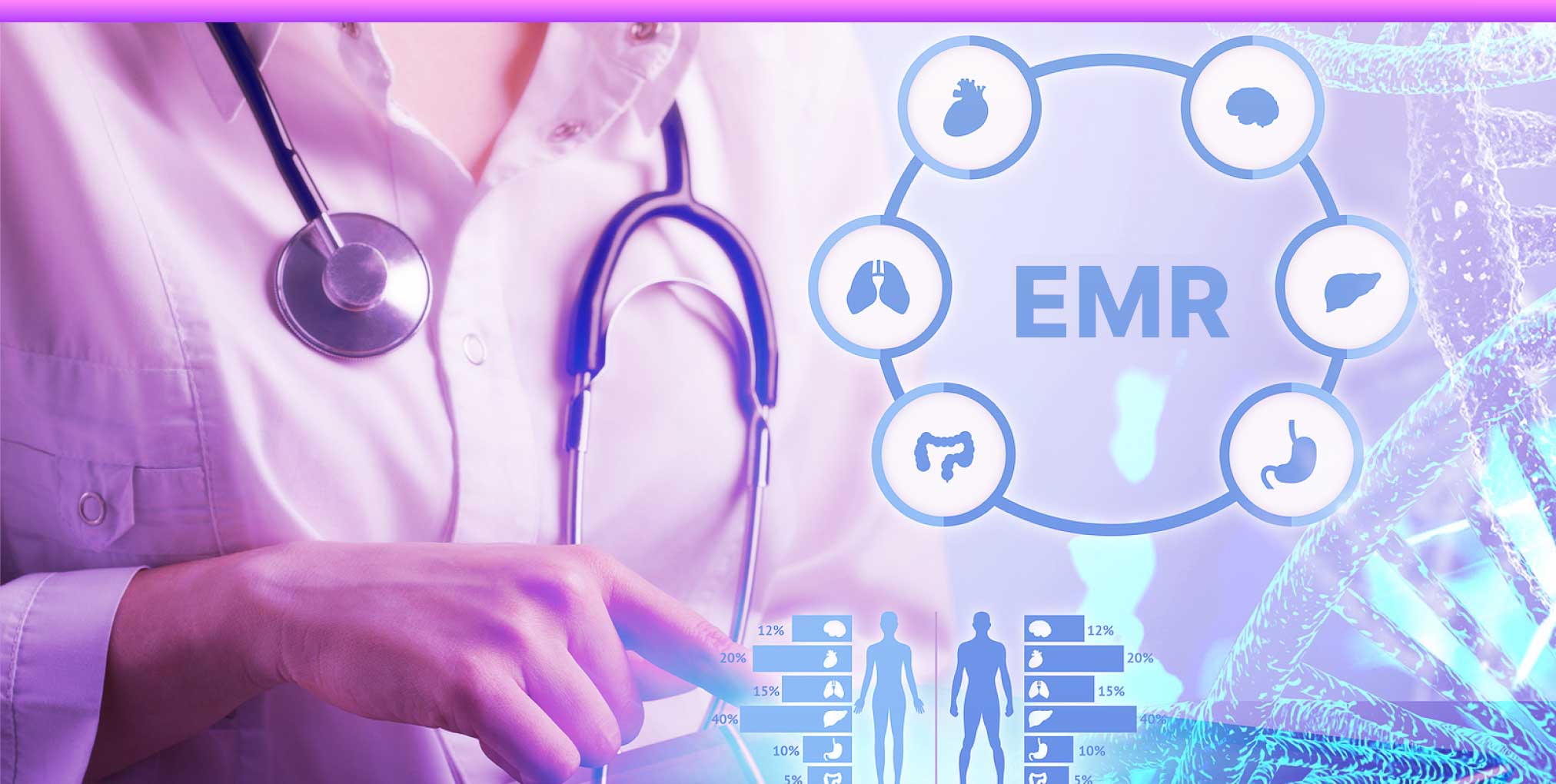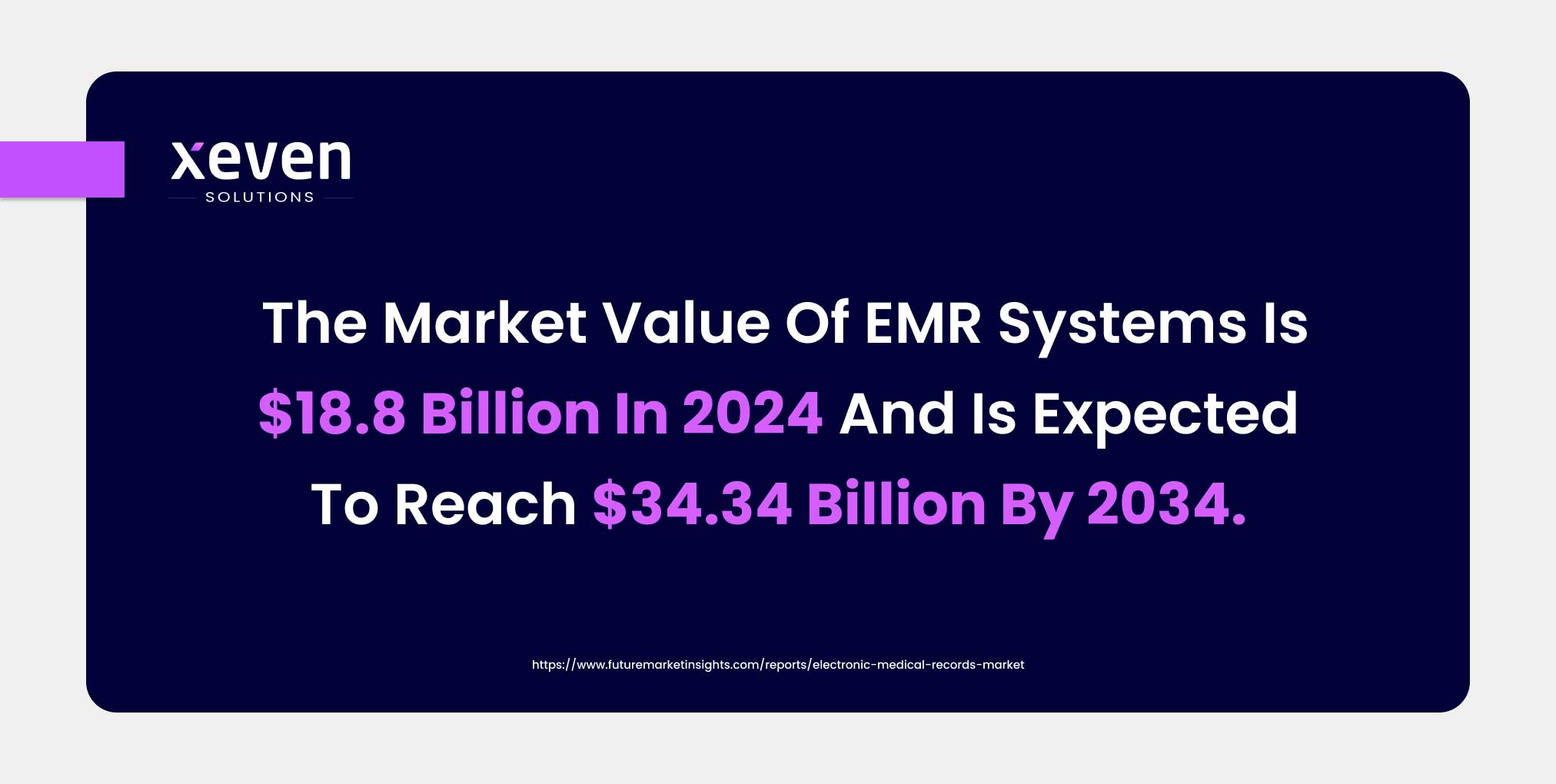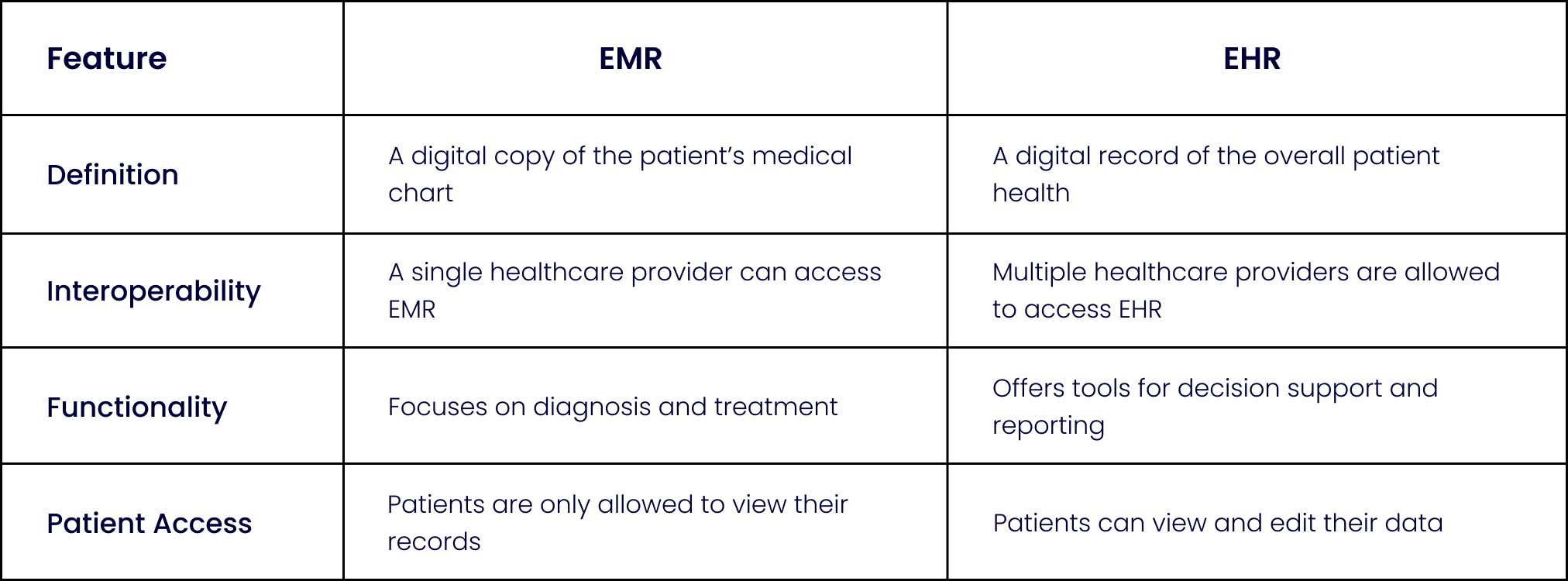

October 15, 2024
Imagine you enter a hospital and find out that the caregiver isn’t noting the patient’s details on a paper chart but accessing it digitally. Does it seem far from reality? Guess what—it’s happening! It’s highly possible that many of you’ve noticed it for yourself.
The world has seen a significant surge in the adoption of digital health tools in the medical industry lately, among which the most used are electronic medical record (EMR) systems. According to Future Market Insights, the market value of EMR systems is $18.8 billion in 2024 and is expected to reach $34.34 billion by 2034.

But why are EMRs so crucial? It is because they help healthcare providers store and manage important patient medical information electronically and improve the quality of care. In today’s article, we will learn about EMR System in healthcare, its benefits, must-have features, and more.
An electronic medical record (EMR) is a digital version of a patient’s medical chart created for use within a single practice. These medical charts are stored and managed by healthcare providers using an EMR system. These systems can contain a patient’s demographic information, treatment histories, vital signs, etc.
The easy and quick access to comprehensive patient information allows caregivers to make timely decisions and achieve better patient outcomes. These EMR systems not only store and manage information but also help with multiple administrative tasks like medical billing, prescribing drugs, etc.
Electronic medical records (EMR) offer numerous benefits not only for providers but also for patients. Let’s understand the importance of EMR systems with these benefits:
EMRs automate various administrative tasks like scheduling appointments, managing billing tasks, and charting. This automation reduces time spent on routine tasks, lowers operational costs, and frees up healthcare practitioners to serve patients’ needs.

EMR software solutions make it easier to share data between multiple healthcare systems and team members in a single practice. This communication and collaboration helps providers to remain on the same page and deliver coordinated care.
EMR systems make patient healthcare information readily available to authorized persons. This quick and easy access to accurate and updated records allows caregivers to make data-driven decisions for better patient outcomes.
Outsourcing EMR development to a reliable AI healthcare company helps healthcare providers secure patient data and maintain compliance with international regulations like HIPAA and GDPR. This compliance also reduces the risk of legal and financial penalties.
One of the top benefits of EMR for patients is improved care quality. Healthcare providers have access to complete patient medical records that assist in diagnosis and offering personalized treatments. Moreover, these systems eliminate the risks of medication errors, thus promoting better human well-being.
When doctors don’t receive test results promptly, they might need to order the same tests again. EMR systems help overcome this challenge by keeping doctors informed about past tests. It reduces the need for expensive and unnecessary tests and procedures, thus lowering costs for patients.
The best thing that EMR systems do is to empower patients. It helps patients actively participate in their healthcare journey. With EMR solutions, patients are able to access their health records online, schedule appointments, and communicate with healthcare providers more easily. Moreover, they can track their health status and treatment options.
As a healthcare provider, you must be aware of different types of EMR systems and the right features to meet your organization’s needs. However, it is highly possible to overlook the true objective during this nerve-wracking process. To help you select the best EMR system, we have curated the top 4 EMR features that you must consider to make sure your investment pays off. Here are some must-have EMR features for 2025:
One of the most essential features of EMR systems is creating and customizing templates. These templates are easy to use and used to fill in patient information quickly. The personalization ability allows healthcare providers to include fields relevant to their practice or create their own templates that will speed up the workflow process. Apart from accelerating the documentation process, the customizable templates minimize the risk of errors by providing structured fields.
To my surprise, multiple reports reveal that medication errors are the third leading cause of death in the United States. These medication errors can be due to prescription errors and misinterpretations of handwriting. The E-prescription feature of an EMR system helps to minimize these errors by enabling caregivers to prescribe drugs electronically. The best part is that these e-prescriptions are sent directly to the pharmacies of the patient’s choice from where they can get their medications. What’s more, patients can request refills using the EMR system.

We all love convenience, don’t we? So, why overlook it when it comes to providing convenience to your patients? It is crucial to have an appointment scheduling and reminder feature. It allows patients to book, manage, and reschedule appointments with their preferred healthcare professional. You might be surprised to know that 67% of patients prefer online booking. Moreover, with automated reminder features, you can reduce no-show rates and improve your revenue.
Revenue cycle management or integration with medical billing solutions is another important feature of an EMR system. It helps automate billing processes by capturing and organizing patient data. This integration also eliminates billing and coding errors and helps providers accurately manage claims to improve financial performance
It’s common to hear people using EMR and EHR interchangeably. But are they truly the same? Or are there any differences between these two modern healthcare information systems? Let’s clarify this common confusion and understand their unique roles that will help you choose the right fit for your practice.

The choice between EMR and EHR depends on your organization’s needs and the goals you want to achieve. Need expert advice about which one to opt for? Get a free consultation from our experts to make the best decision.
The cost of EMR system development varies depending on project requirements, features, and the vendor you choose. The EMR system cost can cost up to $40,000 for basic functionality and up to $450,000 for a more complex one. I suggest you contact a third-party vendor to discuss your needs and get an accurate cost estimation.
Xeven Solutions is a top EMR software development company that has been meeting evolving healthcare needs for the last 10+ years. We have a team of 200+ engineers proficient in delivering secure and HIPAA-compliant EMR systems to help healthcare organizations improve healthcare delivery standards and revenue. Book a free consultation today to discuss your needs and learn how we can help you achieve your goals.